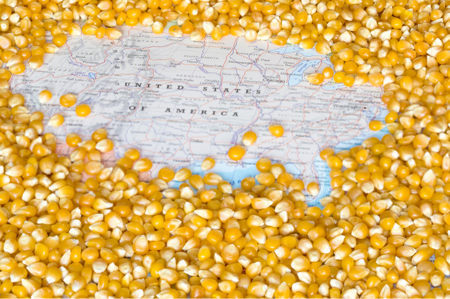Corn Competitors Join Forces to Boost Trade
Category: Grains
 (Iowa Farmer Today) – U.S. corn producers are competing for exports head-to-head with their South American peers, but behind the battle they’ve teamed up to promote corn technology and grow export opportunities.
(Iowa Farmer Today) – U.S. corn producers are competing for exports head-to-head with their South American peers, but behind the battle they’ve teamed up to promote corn technology and grow export opportunities.
“You can get in the weeds and think you don’t want to do business with your competitors,” said Pam Johnson, Iowa farmer and former president of the National Corn Growers Association. “But if we look at the needs of 9.7 billion people in 2050, there’s enough work to go around for all of us.”
Several years ago, Johnson and Julius Schaaf, another Iowa farmer who served as chairman of the U.S. Grains Council, participated on a trip to Brazil and Argentina to study their competition. They found the countries had so many issues in common that they should work together.
Johnson, Schaaf and other industry leaders worked with their counterparts in Argentina and Brazil to develop Maizall: The International Maize Alliance. The organization, launched in 2013, focuses on three areas:
Communicate benefits of modern agricultural production technologies,
Address asynchronous approval of biotech products, and
Promote regulatory harmonization.
Leaders from each of the organizations are well connected to policymakers.
One board member from Brazil is a friend of the World Trade Organization director-general. The director-general of the Food and Agriculture Organization has friends in Argentina’s corn group. A former Brazilian ag minister, a World Food Prize winner and other national corn leaders are active in Maizall.
The U.S., Brazil and Argentina represent half the world’s corn production and around 80 percent of global exports.
“When we walk into a room and speak with one voice about concerns we all have, it gets attention,” Johnson said.
Maizall representatives who go to a country to talk corn normally start by meeting with their own government officials in the country. They talk about the importance of science and innovation to farmers in the three countries and to the rest of the world.
“Maizall’s biggest focus is telling the farmer’s story, from a farmer’s point of view,” Johnson said. “All of us in the three countries can give a personal story about why science brought back to the farm changed not just our own farms, but our farm economy.”
The organization recently hosted a group of Uganda parliament members trying to write a law that allows farmers there to grow biotech crops.
“They went home not just with a template for a document they would use to write this bill, but they also had background information from regulatory officials in Brazil,” Johnson said.
Uganda could be the catalyst in Africa to counter activists who are scaring consumers and government officials with stories about foods from biotech crops.
“We may never sell a kernel of corn to Uganda,” Johnson said. But Africa is a big continent with a growing population and great soils.
“To bring the voice of reason and scientific process to start the dialog in Africa, that could change policies not just in Uganda but hopefully in all those countries around Uganda; if we could change the opinions of government officials, regulators and farmers … In the end, that’s an important goal.”




